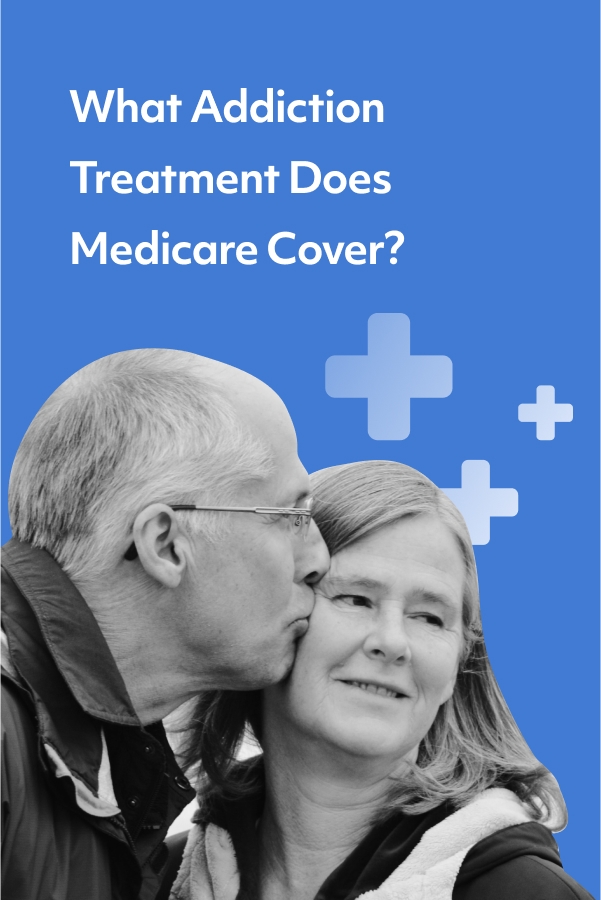If you’re not sure what addiction treatment Medicare covers, we have answers. We’ve done the research to help you find Medicare-covered, high-quality care for drug or alcohol addiction.
What is Medicare, and how do I know if I have it?
Here’s the thing—insurance is confusing, and Medicare doesn’t make anything simpler by sounding so much like Medicaid, which is a completely different type of health insurance. So let’s start by defining some basic terms to help you understand what type of insurance you have.
Medicare: According to Medicare.gov, Medicare is the federal health insurance program for people who are 65 or older, or certain younger people with disabilities (and also people with end-stage renal disease). This is sometimes referred to as Original Medicare. Original Medicare includes Medicare Part A, which helps pay for inpatient care in hospitals or a post-hospital skilled nursing facility, and Medicare Part B, which helps pay for medically necessary provider appointments, outpatient care, and some preventive services.
Medicare Advantage Plan: The federal government created Medicare Advantage to provide people with more options for healthcare. Private health companies sell Medicare Advantage Plans, which then cover Medicare services. If you’re in a Medicare Advantage Plan or other Medicare plan, your plan must provide at least the same coverage as Original Medicare.
Medicaid: Medicaid offers health coverage to low-income adults and children, as well as people with disabilities. Medicaid is administered by individual states. Learn more at Medicaid.gov.
What Addiction Treatment Does Medicare Cover?
Medicare often covers treatment for opioid and alcohol use disorders. These are just guidelines—to fully understand your plan, it’s important to reach out to Medicare or your Medicare Advantage plan directly. There are three factors involved in Medicare covering your addiction treatment:
- Your provider must state that treatment is medically necessary.
- You must receive services from a Medicare-approved provider or facility.
- Your provider must set up a plan of care. This is the clinician’s plan for your treatment.
Workit Health offers a Medicare-approved digital program in many states. If you’re unsure of what type of treatment you need, let’s break down the types of addiction treatment available, and whether or not Medicare covers them.
Does Medicare pay for outpatient treatment?
If you’re receiving treatment from a Medicare-approved provider or facility, the answer is yes. Part B of your Medicare plan should cover outpatient or office-based substance use treatment services, but you are still responsible for your deductible. The provider’s office or outpatient center should have information on what exactly your costs would be. Here are a few different types of outpatient addiction treatment you might receive:
Some traditional treatment programs offer day or evening outpatient programs that focus on group therapy, counseling, and many of the same things as inpatient treatment, but in a less intensive setting.
Office-based addiction treatment is becoming more prevalent and may include FDA-approved medication for addiction in an office setting, rather than in a hospital or methadone clinic. Workit Health offers medication for opioid addiction (Suboxone), now covered by many Medicare plans. These programs are 100% virtual, so you can receive treatment from home.
Additionally, opioid treatment programs (OTPs) should be covered by your Medicare plan. You may have heard these referred to as methadone clinics. They offer on-site dosing of opioid addiction medications like methadone and buprenorphine (Suboxone) under the supervision of staff.
Medicare Part B covers these kinds of outpatient treatment, as long as they meet the three criteria listed above.
Does Medicare cover residential treatment?
Rehab, residential treatment, inpatient care … whatever you call it, this refers to treatment that is usually highly structured and supervised by a team of staff. Like any type of treatment, the quality and content of these programs can vary a lot, so it’s important to evaluate all your options when choosing addiction treatment. The one consistent part is that this kind of treatment involves living in a facility while focusing on your recovery. The length of the stay can vary based on the program, severity of the addiction, or insurance coverage.
According to Medicareinteractive.org, your Medicare plan’s cost-sharing for inpatient care would apply to inpatient care and it would be covered under Part A, which applies to inpatient care in hospitals, skilled nursing homes, and treatment facilities.
The length of your stay in rehab seems to mostly depend on how much you are able to pay—the first 60 days of treatment are covered with no co-insurance, but there is a $1,556 deductible for each stay period. That means you will be responsible for at least that deductible amount. If you need longer than 60 days (this would be rare for most inpatient treatment programs) you may accrue additional costs, including a daily coinsurance payment. Although rehab may be the type of addiction treatment people are most familiar with, it isn’t the only, or even best, option for many people. There are many alternatives to rehab out there.
Does Medicare offer transportation to my appointments?
You may not have transportation to your appointment, or you may not be comfortable driving. In our clinic states, Workit Health offers telemedicine addiction treatment which means you meet with your clinician, coach, and therapy group online. Your provider will e-prescribe your medication to your local pharmacy.
If you’re not able to sign up for telemedicine treatment or if you live outside our treatment area, there may be options for transportation to medically necessary appointments for Medicare members. Although Original Medicare does not usually cover rides to appointments, other organizations and agencies, like your area on aging or senior center, may offer transportation. The rideshare company Lyft has begun partnering with Medicare Advantage plans to offer transportation in some areas, so if you’re covered by Medicare Advantage you should reach out to your plan for more specific transportation options.
Does Medicare cover medication-assisted treatment?
Medicare Part D covers prescription medications. If you have Medicare Part D and your provider has determined that a medication like Suboxone (buprenorphine/naloxone) or naltrexone is medically necessary, your plan will usually cover it. If you have a Medicare Advantage plan that includes prescription drug coverage, it will also usually cover naltrexone, Suboxone, or another buprenorphine/naloxone medication.
Where can I get more information about what type of addiction treatment Medicare covers?
There are a number of resources online to help you understand Medicare and Medicare addiction treatment options:
Medicare.gov: This is the official US government site for Medicare. Here you can signup for Medicare and understand what Medicare covers. You can also find local assistance with your Medicare plan.
Medicare Interactive: Created by the Medicare Rights Center, this is a free and interactive tool that offers easy-to-understand answers to questions about Medicare.
Center for Medicare Advocacy: The Center for Medicare Advocacy is a national non-profit which provides education and legal assistance to people covered by Medicare. Anyone can contact the center for help.









